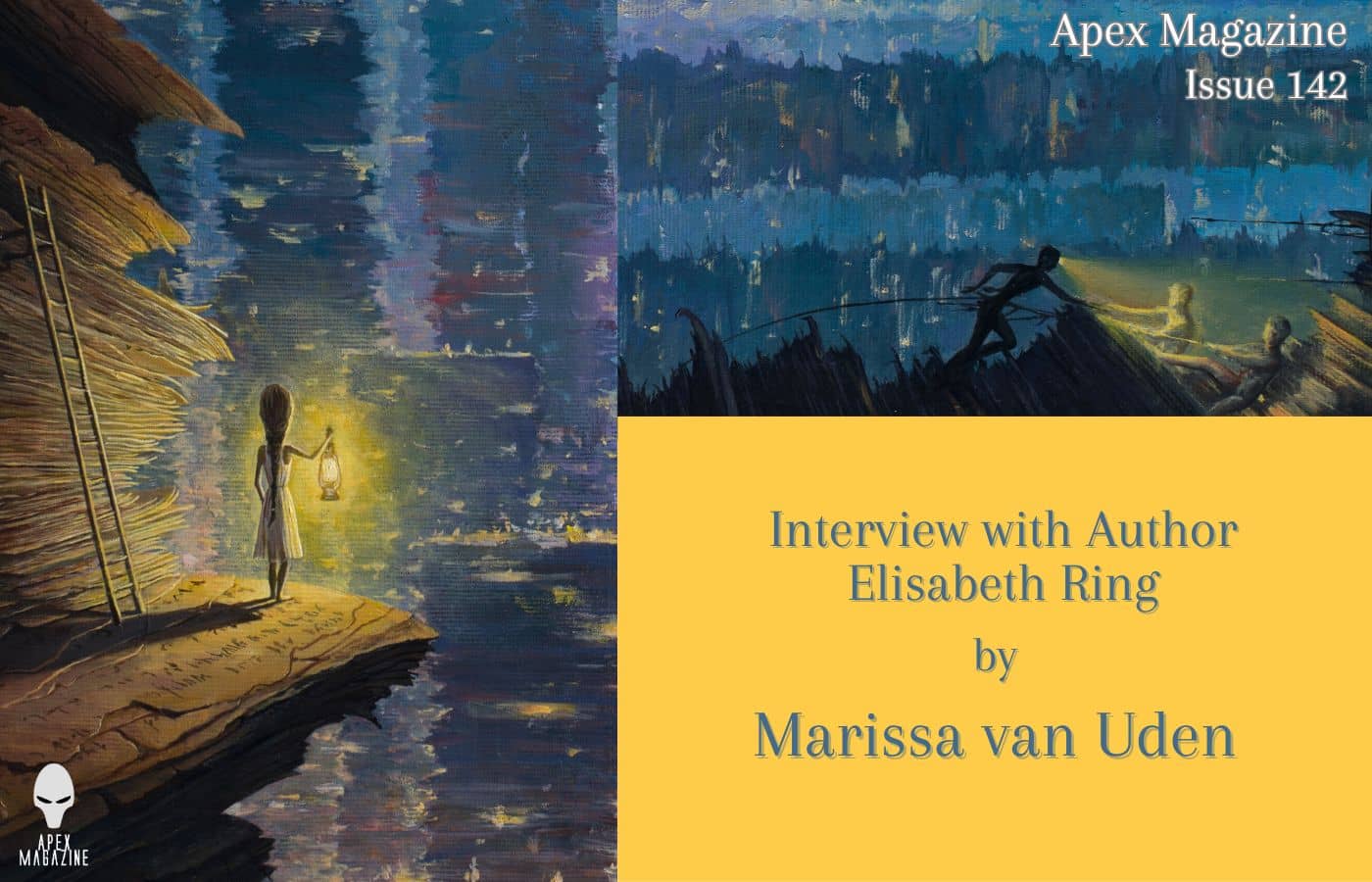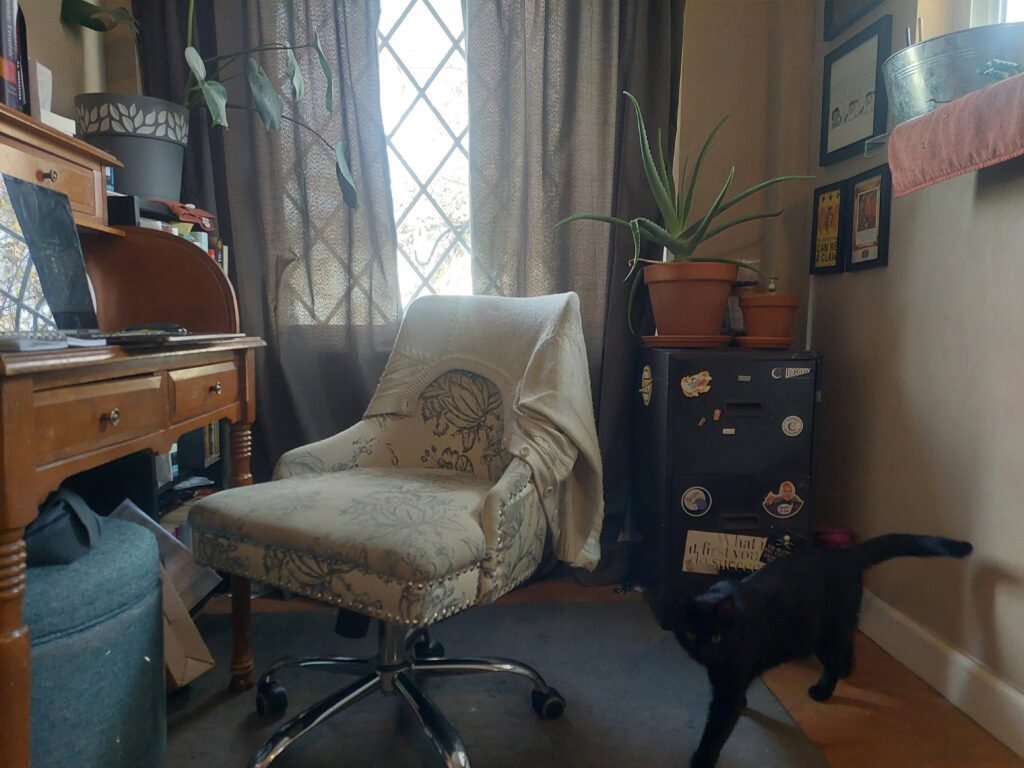
In “When No One Has to Say Goodbye,” by Elisabeth Ring, scientists have found a cure for death, but people can still lose everything they know by being infected by the mysterious “masses.” These drifting, squelching bodies of flesh infect and incorporate all who enter them. No one really knows what it’s like inside a mass because no one has ever made it back out, but some speculate that it’s a better and more interconnected future. And one of those people is our narrator’s boyfriend, Caleb. He wants them to prove their love by joining a mass, to truly become a single entity that will be together forever. Along with the narrator, the reader is drawn into this toxic relationship with Caleb and then ever closer to the pulsing masses of flesh, which mirror Caleb’s need to subsume others. It’s a chilling tale of “romance” turned horrifying.
Elisabeth Ring is a writer and reader of eclectic things. Her fiction has appeared in publications including Apex, Wyldblood, and Martian Magazine. She spends most of her time trying to wear out her energetic dog and keep her cat away from the houseplants. When she has time, she makes progress on her unwieldy TBR pile, and writes reviews on some of those books. You can read them at ringreads.com.
Marissa van Uden: Thank you for joining us today, Elisabeth! I so enjoyed reading this unsettling and surreal story about terrible relationships and all-consuming entities. Could you tell us a bit about how this story came about and it’s development?
Elisabeth Ring: The dark assumption hidden in the subject of immortality is that living forever would be pleasant—that you’ll be healthy and strong for that eternity. I started wondering what would happen if that wasn’t the case, and if death were “cured” but not all disease. Matter, after all, cannot be created or destroyed, just transformed.
There’s also the reality that everyone, no matter how much or little we have, or how much we love those around us, will be separated by death at some point. That inevitability sometimes tempts me into a sort of impatient nihilism—if we’re all chum, what are we waiting for? Between those two thoughts, I conjured this image of disease personified, and of someone so afraid of losing their loved one that they would leap into what they feel to be the least awful of the available inevitabilities.
MVU: This story is about a terrifying kind of love—one that all too many of us have encountered. It destroys a person’s individual identity and agency, dissolving their sense of reality. I love how chilling you made the otherwise sweet sentence “I don’t ever want to have to say goodbye.” Are toxic relationships something you are drawn to exploring in fiction? What do you find the most challenging about writing them?
ER: I have been thinking a lot about relationships over the last few years, and it’s been sort of an iterative process of noticing the relationships around me in a new light and deconstructing what I see. It’s fascinating and terrifying to see how much love two people can have for each other and yet exist in such a toxic atmosphere, especially given the prioritization that culture and art has on love conquering all. When people think of toxic or abusive relationships, they often think of this environment driven by fear and resentment, and while that can be present, it isn’t always. Looking at toxic relationships around me—mostly romantic or committed, but also platonic and familial—they can be stuffed with genuine love, but so often one or more people in the relationship is too emotionally unhealthy for that love to not be barbed.
Fiction is rich ground for exploring that dynamic, but it’s easy to make one person into a villain and all of their traits part of that villainy. As I’ve talked to various friends and family members about the abusive relationships they are or have been in, almost universally they hesitate or refuse to use the term “abusive.” Mostly, they say it’s “complicated.” They often have explanations for the clearly abusive behavior occurring, and their love for the person emphasized, even if they can’t excuse the abuse itself. As I examine my “complicated” relationships, I’ve had the same hangups in labeling them, too. The complexity is part of the story, and while it’s harder than telling a story in black and white, it’s far more interesting—and honest.
MVU: This story is almost a mirror of your fantastic flash piece “From This Beating Heart, From This Fractured Mind,” which was also published in Apex Magazine (Issue 140). That story shows the reader all the ways in which the two partners could be expected to lose patience with each other and turn away from each other’s so-called flaws … and yet they are held together by this beautiful genuine love and acceptance. Did you set out to write a story that is the converse of that piece, or did this just happen organically?
ER: Every relationship is going to have moments of conflict and impatience; the way those are handled in the moment, and afterward, is what separates the healthy relationships from the toxic ones. Writing a story with a healthy, supportive relationship felt odd in a lot of ways for the previously mentioned reasons, but also really refreshing.
Tolstoy’s quote about every happy family being alike and every unhappy family being unhappy in its own way is, I think, reductive. There may be more ways things can go off the rails while there’s only one set of those rails, but staying on them requires attention to as many things as can go wrong. I didn’t intentionally put the two pieces in conversation with each other—they were written months apart—but both are a part of a conversation I’m having with myself about what constitutes happiness and healthiness in relationships in whatever forms they take.
MVU: Marissa, the narrator in this story, is trying to convince herself of a narrative that the readers know is wishful thinking and delusion. I thought you did a great job of balancing those two interpretations of the situation, where the reader or outsider is able to get a read on the situation that the character experiencing it is missing. Could you talk a little about that: did it take many revisions to refine this or did it flow naturally once you were in the character’s head?
ER: Ah! That’s what I like to hear! Balancing those two perspectives was important to me from the beginning, and it was something that I paid a lot of attention to in revision. My longsuffering writing group was a huge help in the Goldilocksing of this—adding more romance here, but not too much; making Caleb a little more sympathetic there, but not too sympathetic; showing more codependency over there, but not being so obvious about it. Obviously, Caleb does not come out well in this story, nor did I want him to be some tortured hero. But I hoped that in showing how sympathetic he is to Marissa, he would be at least a complicated figure to the reader. I also wanted to respect Marissa enough to show why it might not be easy to leave Caleb, even as her discomfort grows.

MVU: Before you sit down to write, do you have any favorite practices or rituals you do to get yourself in the right mindset, or do you tend to write on the go, anywhere and anytime?
ER: Some things come in the spur of the moment, and I jot them down in a notes app. Usually it’s just concepts or little bits of dialogue that come to me when I’m on the go, but sometimes it’s more. For example, a couple of times I’ve woken up with a fully-formed story that gets sleepily written down immediately because I know I won’t remember it in the morning.
Usually, though, I try to cultivate an atmosphere with as few unwanted distractions as possible: noise-canceling headphones with music playing, an earthy scented candle, and multiple beverages and snacks within arm’s reach so I don’t have to get up for anything. Of course, then the cat will get the zoomies, or the dog will want to be let out (and then in, and then out, and then in), but, you know, you try your best.
MVU: Haha, yes I can so relate to that. It’s always the zoomies or walk time just as I’m settling in to focus. Bless them, though. I also read your wonderful drabble, “Who Needs Words When You’re In Love,” published in Martian Magazine. As a fellow writer of worm stories (long live worm fiction!), I thought this piece was just delightful! Is the drabble a form you play with often? What do you love about it?
ER: I am a chronic overwriter. Give me a short story prompt and I’ll give you a novella. I’ve always veered toward longer forms of writing for this reason, but a few years ago I started being really intentional about writing shorter works. I’ve found it’s much more challenging to limit a story in this way, but it’s also rewarding when something works. Because I still overwrite my short fiction, I’ve been challenging myself with word limits. Writing drabbles, with their firm word limit and need for all the usual story elements, is as unforgiving as it is helpful for me.
MVU: You also maintain an amazing book review site, ringreads.com, started during the pandemic. When I checked it, you’d reviewed 258 books (!) with 84 on your TBR list. That’s a lot of books! How quickly do you read, when do you read, and what are your absolute favorite places for getting comfy and fulling immersing in a good book?
ER: I was one of those undiagnosed neurodivergent kids who inhaled books with terrifying speed. As an adult, it’s not as easy to sit down with a book, or to focus on reading one. Ebooks and audiobooks might lack the emotional and literal heft of paper books, but I’ve found that those mediums help me to make reading work for me now. Sometimes I will still curl up on the couch or sprawl out on a hammock with a book, but more often I’m reading on the bus, in line at the grocery store, on a walk with the dog, in bed when I can’t sleep yet again, in the corner at a party I’ve run out of social battery to enjoy any longer—anywhere and everywhere.
MVU: I’d love to know how reviewing this consistently has affected your reading. What have you noticed is different about how you experience a book now compared to before you started the site? And do you have some kind of process, like questions you ask yourself as you go, or note-taking methods you use to craft and organize your reviews?
ER: At different points during my day-job career, I’ve reviewed music and film, so I did anticipate my view of reading changing somewhat as I started reviewing books. When reviewing, you can’t just say, “I liked it,” or “I didn’t like it.” Why did you like it? Why did it work? What more can you offer to the conversation than what’s already been said? Did it not work, or did it not work for you specifically? I try not to learn more about a book than necessary before reading, but I will often look up author interviews or posts afterward for more context on what I’m digesting. And while I do occasionally make notes or tab quotes I particularly like, I typically lay out my thoughts right after reading, let things simmer for a few days or longer, and then come back to it and see how I feel after a bit.
I don’t review every book I read, and going through so many books has made me less afraid to cross one off as a Did Not Finish. But there are times when I’ve been in a rut and my self-imposed deadline demands that I come up with something to say about the book at hand. Often, I’m glad that I’ve had to dig in deeper. Build Your House Around My Body by Violet Kupersmith was one I almost set down after the first few chapters because of its unconventional method of storytelling. I powered through for the sake of the blog. Now I’m a huge evangelist for that book. Absolutely spectacular.

MVU: What are the books you’ve most recommended (or gifted) to others?
ER: The Archive of Alternate Endings by Lindsey Dranger. It’s short, and it doesn’t have an ebook or audiobook, but it destroyed me in the very best possible way. I also love recommending In the Dream House by Carmen Maria Machado, which is another bizarre work that blew me away. In nonfiction, I’m fascinated by Lindsey Fitzharris’ two medical histories, The Butchering Art and The Facemakers, but for some reason not a lot of people want to learn about ye olde surgery. Baffling.
MVU: Thank you so much for sitting down to talk with us. Can you tell us about anything you’re working on next, or any other publications forthcoming that readers should keep an eye out for?
ER: Right now, I’m really excited about a couple of longer-form stories I’ve been working on. One is a novella (that, yes, did start out as a short story) about a happier couple whose relationship is strained by cataclysmic weather and a pattern of murders in their apartment building. The other is a novel about two sisters, one of whom is trying to solve or come to terms with the murder of the other sixteen years before. Both have more of a mystery element than I usually work with, so it’s been a great learning experience.








